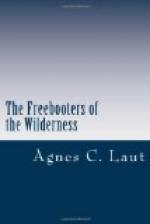PART I
THE MAN ON THE JOB
FREEBOOTERS OF THE WILDERNESS
CHAPTER I
TO STRADDLE OR FIGHT
“Well,” she asked, “are you going to straddle or fight?”
How like a woman, how like a child, how typical of the outsider’s shallow view of any struggle! As if all one had to do—was stand up and fight! Mere fighting—that was easy; but to fight to the last ditch only to find yourself beaten! That gave a fellow pause about bucking the challenge of everyday life.
Wayland punched both fists in the jacket pockets of his sage-green Service suit, and kicked a log back to the camp fire that smouldered in front of his cabin. If she had been his wife he would have explained what a fool-thing it was to argue that all a man had to do was fight. Or if she had belonged to the general class—women—he could have met her with the condescending silence of the general class—man; but for him, she had never belonged to any general class.
She savored of his own Eastern World, he knew that, though he had met her in this Western Back of Beyond half way between sky and earth on the Holy Cross Mountain. Wayland could never quite analyze his own feelings. Her presence had piqued his interest from the first. When we can measure a character, we can forfend against surprises—discount virtues, exaggerate faults, strike a balance to our own ego; but when what you know is only a faint margin of what you don’t know, a siren of the unknown beckons and lures and retreats.
She had all of what he used to regard as culture in the old Eastern life, the jargon of the colleges, the smattering of things talked about, the tricks and turns of trained motions and emotions; but there was a difference. There was no pretence. There was none of the fire-proof self-complacency—Self-sufficiency, she had, but not self-righteousness. Then, most striking contra-distinction of all to the old-land culture, there was unconsciousness of self—face to sunlight, radiant of the joy of life, not anaemic and putrid of its own egoism. She didn’t talk in phrases thread-bare from use. She had all the naked unashamed directness of the West that thinks in terms of life and speaks without gloze. She never side-stepped the facts of life that she might not wish to know. Yet her intrusion on such facts gave the impression of the touch that heals.
The Forest Ranger had heard the Valley talk of MacDonald, the Canadian sheep rancher, belonging to some famous fur-trade clans that had intermarried with the Indians generations before; and Wayland used to wonder if it could be that strain of life from the outdoors that never pretends nor lies that had given her Eastern culture the red-blooded directness of the West. To be sure, such a character study was not less interesting because he read it through eyes glossy as an Indian’s, under lashes with the curve of the Celt, with black hair that blew changing curls to every wind. Indian and Celt—was that it, he wondered?—reserve and passion, self-control and yet the abandonment of force that bursts its own barriers?




